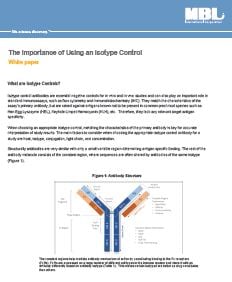The Importance of Using an Isotype Control
Reliably Determine Specificity vs Background for Precision Drug Development Assays
The accurate measurement of drug effects requires the use of an appropriate negative control. For antibodies in in vivo studies and immunoassays this means using an isotype control – a monoclonal, subclass specific control antibody which is used to reliably differentiate between specificity (antibody binding in an antigen-dependent specific manner) versus background (non-antigen dependent mAb binding due to Fc receptors or other proteins).
This White Paper covers the main aspects to using isotype control antibodies, from selecting the right control for your study to the main study types for which these negative controls should be used. The White Paper also details the reasons why isotype controls are essential tools for accurate measurement of antibody drug effects, and the problems that can arise from switching to more simple controls such as PBS.
Download this White Paper to Understand:
- The importance of using an isotype control, and how to choose the appropriate control for any given antibody study
- Why PBS is not a suitable substitute for an isotype control, with examples of how PBS use causes a range of issues which can hinder study performance and contribute to erroneous results
- Why isotype controls are also an ideal negative control for immunohistochemistry experiments
After downloading this informative White Paper, contact us or review our product portfolio, to see which antibodies will work for you.
